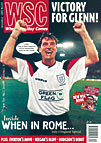 Referees are often the focus of derision, but is it right that players should get away with dishing out so much abuse?
Referees are often the focus of derision, but is it right that players should get away with dishing out so much abuse?
Imagine a school football match ten, 15 years ago. As a matter of course players in both sides will copy three things they have seen footballers do on television: forwards will stand in front of the goalkeeper with their arms outstretched; the star midfield player will trudge away with hands on hips and head down when a decision has gone against him; and everyone, but everyone will spit (and effect not to notice when it dribbles down their shirt).
These days, kids picking up on what the pros do are far too busy to play much football. The British, it is said, are not an expressive race. But you’d never believe it if you watched a professional football match in 1997. At some point in every game, it seems, tempers will boil over. Incidents have different causes but the most common theme is appears to be moral outrage at someone else’s actions.
It might be when a player goes down in a heap, and an opponent stands over him pointing and shouting accusatory manner before being hustled away by teammates, the referee or even on occasion a policeman; it could be at the end of the match when a running argument erupts into a bout of shoving in the tunnel (as happened at Selhurst Park recently when David O’Leary pursued Michael Hughes, whose alleged dive an hour and a half earlier won the penalty by which Wimbledon beat Leeds). Rows between team-mates also seem far more common today than in the past, and unlike in the time when Charlton’s Derek Hales and Mike Flanagan got sent off for squaring up to each other, are often deemed to be a good thing.
Shouting has never before been so highly valued. Although he does have other skills, an appreciable part of the conventional wisdom behind Liverpool signing Paul Ince was that he would, when necessary, yell his socks off. Whether it was the opposition, the referee, or David James who needed a verbal buffetting, Incey was the man. Peter Schmeichel appears to object to ever having to do any work whatsoever in the United goal, such is his annoyance when his defenders so much as win a goal kick, rather than nicking the ball and taking it upfield themselves.
Anyone taking part in a match is now guaranteed to get several earfuls during the ninety minute, and no-one more so than the referee. Players seem to have decided that failure to go around shouting the odds the whole time, is a sign of a lack of commitment. This is hardly catastrophic in itself yet recent events have set the alarm bells ringing about where all this may end.
Dissent has always been around but the increasingly histrionic questioning of referees’ decisions on the pitch could be leading football down dangerous paths. When Emmanuel Petit raised his hands to Paul Durkin in Arsenal’s 0-0 draw with Aston Villa, he brought back some ugly memories, of Leeds 1, West Brom 2, 17th April 1971.
At the time Leeds were chasing both the championship and the UEFA Cup. Yet they lost at Elland Road in mid-April to a team who hadn’t won away in 16 months, taking the destiny of the title out of their hands, thanks in part to a ‘not offside’ decision which so incensed the Leeds players that they harangued and jostled the referee – until bewilderingly they found themselves protecting him from a pitch invasion. Leeds’ first four home matches of the following season were, as a result, played at other grounds as a punishment.
It is easy to see what went through the fans’ heads – if it is okay for the players to jostle the referee, then why not us? That level of dissent from the players was unusual, but today it is all too prevalent. It is hardly a surprise that someone has gone a step further; nor that the second a referee felt hands on his chest he reached for his red card, to the dismay of Arsène Wenger.
Yet there have already been isolated incidents at lower division games where members of a crowd have physically tackled officials. Sometimes supporters go too far, sometimes the referee has made such a bizarre decision that that sort of reaction is only to be expected.
But the second that players are allowed to go that extra step, ghosts which football – at least domestically – hopes to have buried re-emerge. Leeds were playing a crucial end-of season match; Arsenal an early season game that left them just one point adrift with months to play. Paul Durkin’s red card ought to have sent a warning to those who may be tempted to take 1990s shouting culture that step further when the heat is really on.
From WSC 130 December 1997. What was happening this month